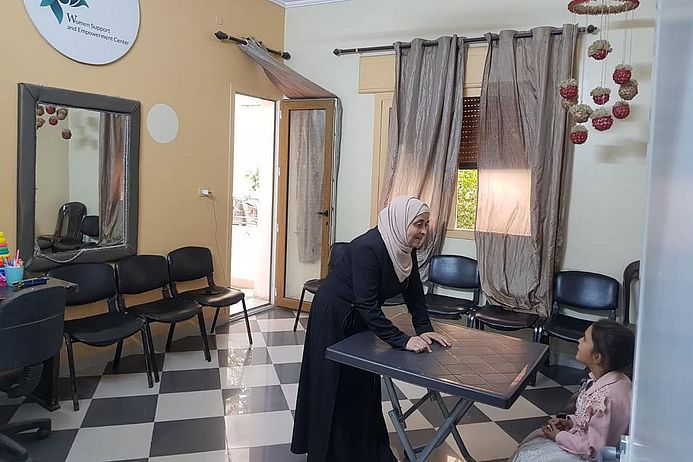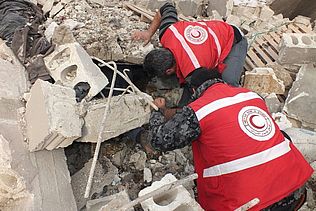By Radwa Khaled-Ibrahim
On Oct. 05th , 2023, the Syrian and Russian military began bombing Idlib in Northwest Syria. It is the strongest escalation since the Russian-Syrian offensive in 2019 when circa 100 hospitals were targeted, thousands of civilians killed and hundreds of thousands became internally displaced persons (IDP). The attack, meanwhile on the edges of Idlib, for example at Gesr el Sheghour and Ariha, is still ongoing.
"On Thursday night, I woke up startled at 5:00 a.m. because a bomb hit not far from us." That is what our partner Huda Khayti reports, director of the Women Support and Empowerment Center in Idlib, Syria, which medico and Adopt a Revolution have been supporting since 2014.
There, activists in the enclave besieged by the Assad regime offer women and girls literacy, English and computer courses as well as legal advice and exchange knwoledge. Huda Khayti set up these structures after the women's center she founded in Eastern Ghouta was destroyed during the war. As an IDP herself, she came to Idlib and has continued her involvement there despite the threat from the Islamist terrorist militia Haiʾat Tahrir ash-Sham. She and her team travel several times a week to the refugee camps in the region and offer their work. The center also provided life-saving support during the earthquake, the effects of which are still being felt. In the current military escalation, it is precisely such institutions that are in danger.
Escalation of violence
The military operations are supposed to be a respond on the Islamist attack on a Syrian military academy in Homs on the same day. "It's worse than 2019," Huda says, "after the earthquake, people had gotten used to what was at least relative safety, but they are exhausted and have no strength left." The current attacks are specifically targeted against civilian structures. In total, more than 51 attacks have been counted, 44 of them in Idlib. According to the Syria Network for Human Rights report, 13 of them targeted schools, eight targeted medical facilities, five targeted rescue facilities and vehicles of the Syrian White Helmets Civil Defense, eight targeted mosques, and six targeted IDP gatherings and camps. Blood banks, main streets, markets, and residential neighborhoods were targeted. "It seems like the goal is to kill as many civilians as possible," says Huda, who herself had to flee towards Azaz. Documentation of the attacks leave no doubt: these are war crimes and crimes against humanity.
The women's center was hit as well. The last floor was destroyed, the windows, the meeting room, fortunately, the employees could escape in time. Now Huda and her team are back, trying to continue working, offering the courses, and opening the exchange room. Maintaining the center's work under these circumstances is challenging: people are very scared and reluctant to be outside their homes. “People go to work only because the economic situation demands it of them. The center is located near several hospitals. Under normal circumstances, this would be a reason for reassurance, since hospitals are supposed to be protected and safe places under international law.” Currently, they have become places of insecurity.
A lack of everything
The already dramatic humanitarian situation is visibly worsened by the bombardments. Four out of five people in Northwestern Syria do not have enough to eat. According to the World Food Program, partly as a result of the earthquake, 83 percent of the population lives in acute food insecurity. This means that these people have run out of food and have to manage several days without eating.
The Syrian pound has been devalued eight times in the last three years, losing 91 percent of its value on the world market. As a result, Syrian households have also gradually lost purchasing power, while food prices based on the standard reference basket have nearly doubled since last year. Amid rising demand, the World Food Program (WFP) announced in June 2023 that it was forced to scale back its operations in Syria due to an "unprecedented funding crisis." Already last year, food rations in the region were cut by 13 percent for the same reason. This time, up to 2.5 million people across the country could be affected.
With the attacks on hospitals, the already fragile health situation will worsen and push beyond the breaking point. It is estimated that more than half of the medical workforce has already left the country. By 2023, 3.8 million people, or 84 percent of the population, will need medical care - an increase of nearly 25 percent over the previous year.
International political amnesia
"It seems that the international community allows everything," Huda Khayti comments, not without reason. Also, on 05.10, Turkey attacked Northeastern Syria, damaging large parts of civilian facilities there: Water and energy supplies, hospitals and schools, oil fields, factories and warehouses. Humanitarian catastrophe is on the verge there as well. The Kurdish Red Crescent is in non-stop action. For neither part of Syria is an outcry from the international community, no signs of solidarity.
Although the current conflict in Gaza is drawing attention to the region, the crimes in Syria are not being seen. "It feels like people want to forget about Syria." Huda calls this Syrian fatigue: exhaustion over the news from Syria leads people to not want to hear it at all. Western as well as Arab media provide only meagre to no coverage. Syria is in the shadows and shrouded in silence, while international law is violated and massive war crimes are committed.
The words of our partners are clear: "Do they want Bashar to wipe us out so there's one problem less? No one wants to listen to us. If the international community doesn't speak up, there will be no future for us." Therefore, for the horizon of any kind of future to even emerge, a political solution is needed, not just inadequate humanitarian aid that provides temporary relief, if any. The Syrian regime must be held internationally accountable for the crimes it has committed, but there is also need for immediate action to protect the civilian population and its fundamental rights.
It is not over yet
When I met Huda two and a half years ago, she and the other activists of the Center insisted on not being defined by the situation of crisis. Their work did not begin with the disaster, crisis or emergency situation, nor should it end with them. They had set out to build structures, to sow fruitful relationships, to create places of reason and safety, because they understand themselves as revolutionaries and want to pursue this work regardless of an emergency situation. A devastating earthquake and a massive military offensive later, the permanence of the crisis has set in. Huda and the women at the center, however, are not giving up: "What should we do? Of course it is tearing at our strength and health. We stand in the face of a killing machine and we are almost alone. But there is no alternative for us but to continue and to hold on to the possibilities of solidary action, especially in this situation of need. Even if others seem to have given up on us, we are not prepared to give up our human right and hope for the future."


